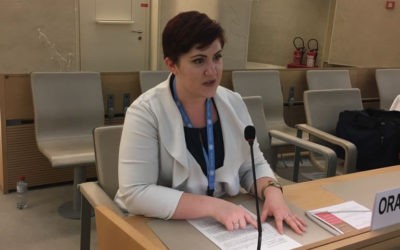UPDATE: On 25 July 2019, the Human Rights Committee published its concluding observations on its review of the Netherlands’ ICCPR obligations, in which the Committee seems to reference Ali’s case: “The Committee is, however, concerned about reports of forced returns of asylum seekers, whose application has been rejected, to . . . Bahrain, allegedly in breach of the principle of non-refoulement.” The Committee also noted that the Netherlands should “[e]nsure that the non-refoulement principle is secured in law and strictly adhered to in practice in all circumstances” and “[e]nsure that investigations are carried out into the cases of breach of the principle of non-refoulement.”
1 July 2019 – Americans for Democracy & Human Rights in Bahrain (ADHRB) participated in the 126th session of the United Nations (UN) Human Rights Committee in Geneva, Switzerland, concerning the review of the Netherlands. ADHRB previously submitted an assessment of the Netherlands’ compliance with its treaty obligations under the International Covenant on Civil and Political Rights (ICCPR) for consideration by the Human Rights Committee. The report evaluates the Netherlands’ involvement in all the violations that Ali Mohamed AlShowaikh was subjected to in Bahrain, examined under articles 6, 7, 9, 10, 13, and 14 of the ICCPR – regarding torture, the right to life, right to liberty and security of person, and the right to dignity of the human person, among others – highlighting the government’s neglect of Mr. AlShowaikh’s rights under the Covenant.
Please find the full report in PDF form here.
Please find the remarks below, or find in PDF form here.
—–
Distinguished Members of the Human Rights Committee,
ADHRB wishes to assess the role of the Government of the Netherlands in the recent refoulement of Bahraini citizen Ali Mohamed AlShowaikh and the impact of this action on the Netherlands’ obligations under the ICCPR.
Mr. AlShowaikh is a Bahraini citizen who participated in peaceful protests in February 2011, calling for democracy and reform. He fled Bahrain, fearing to be targeted because of his brother’s political activism. He sought asylum in the Netherlands, but the Dutch government rejected his asylum request as well as his demand to be deported to “any other country” but Bahrain. On the contrary, the Dutch government deported him to Bahrain on 20 October 2018. He was immediately arrested after arriving by airport police officers.
Officers disappeared him for 11 days, during which they subjected him to torture and coerced him to sign a confession. He was tried under Bahrain’s counter-terror law, which has been repeatedly criticized by the United Nations, including the Human Rights Committee, because it violates international human rights standards and targets human rights defenders and political activists. He was denied access to legal counsel for the first ten weeks of his detention, and even informed the court that his confession had been obtained through torture. Nevertheless, on 28 February 2019, he was sentenced to life imprisonment, revocation of his Bahraini nationality, and a fine of 500 Bahraini dinars on terrorism-related charges. He remains in Jau Prison, where he sleeps in a cell originally designed for eight people, with the prison authorities throwing extra mattresses on the floor between beds at night.
In returning Mr. AlShowaikh to Bahrain, the Netherlands put him at risk of his right to life. The Dutch had reason to believe that Mr. AlShowaikh was wanted in connection for terrorist crimes, some of which can carry the death penalty. As such, ADHRB submits that the Netherlands was in violation of Article 6 of the ICCPR.
The use of torture in Bahrain is so open and notorious that the Netherlands should have been conscious that the risk that Mr. AlShowaikh would be subjected to torture was high. Therefore, the Netherlands was in violation of its Article 7 ICCPR obligations by refouling him.
Although the Government of the Netherlands had knowledge of the Bahraini government’s widespread use of arbitrary detention, the Netherlands sent him there, placing him at risk of being detained in violation of his human rights. As such, the Netherlands violated his right to liberty and security of person under Article 9 of the ICCPR.
The detention centers where Mr. AlShowaikh was held have been identified as locations where torture and ill treatment occur at alarming rates. As such, there was reasonable evidence that Mr. AlShowaikh would be subjected to inhuman and degrading conditions of detention. The Netherlands has contributed to the violation of Mr. AlShowaikh’s rights under Article 10 of the ICCPR by returning him to Bahrain.
We submit that the government of the Netherlands knew or had reason to believe that Mr. AlShowaikh’s rights under the ICCPR would be violated if he were returned to Bahrain – generally due to Bahrain’s poor human rights record, as demonstrated in their treaty body and Universal Periodic Review, and specifically, as Mr. AlShowaikh raised his fears himself. However, the Netherlands returned him anyway. As such, we submit that they are complicit in all of the violations that he was subjected to in Bahrain. We urge the Committee to consider his case carefully when considering the ICCPR obligations of the Netherlands.
Thank you.





